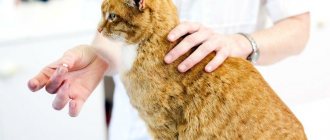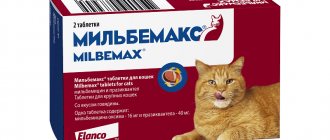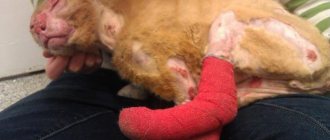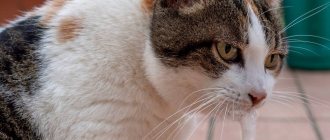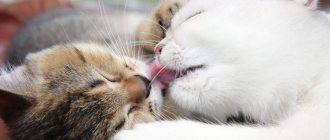Can it be used for vomiting or diarrhea?
Enterosgel is a powerful enterosorbent based on organosilicon substance.
The drug has pronounced sorption and detoxification properties. Thanks to its porous structure, it binds and removes various bacteria and toxins, food allergens, drug residues, poisons, heavy metal salts, and ethyl alcohol from the body.
Despite the fact that this remedy was originally intended to cleanse the human body, it can be successfully used to treat cats. It is recommended to use it if your pet has:
- Vomiting, which can be caused by various reasons. Treatment should be started immediately. Because this condition is dangerous for a small pet.
- Diarrhea, when the pet goes to the litter box unusually often, and the stool becomes liquid and takes on a dark or red hue. Severe diarrhea can cause rapid dehydration and death of the cat.
- Signs of poisoning when several symptoms are combined. The animal becomes lethargic, refuses to eat, and seeks solitude. In such a situation, you should immediately start taking sorbents.
- Symptoms of an allergic reaction are itching, sneezing, watery eyes, lethargy or, conversely, aggressiveness.
- Intoxication of the body by parasites. Worms can cause great harm to a cat's body. As a result of their vital activity, immunity is reduced, internal organs are damaged, and metabolism is disrupted. At an advanced stage of helminthiasis, the toxins that parasites secrete in excess have a strong toxic effect.
Enterosgel is useful for chronic renal failure (CRF), since cats often experience digestive disorders with this disease.
Indications for use
Enterosgel can be given to cats if:
- poisoning with medications, chemicals and heavy metals;
- diarrhea caused by dietary errors;
- helminthic infestations;
- intestinal infections of fungal, viral or bacterial etiology;
- liver and kidney failure;
- overdose of antiparasitic drugs;
- radiation damage;
- allergic reactions;
- diseases of the digestive system (cholecystitis, pancreatitis, dysbacteriosis, colitis, gastritis, enteritis).
Many veterinarians recommend giving Enterosgel to a kitten for diarrhea and vomiting caused by the transition to solid food. The drug is also prescribed for deworming animals in order to protect the body from the effects of toxic substances contained in antiparasitic agents.
Enterosgel helps well with cholestasis, pyelonephritis, cirrhosis, hepatitis and other diseases that cause intoxication.
Important! Enterosgel for cats is ineffective against poisoning by cyanides, solvents, alkalis and acids.
Composition and storage rules
Enterosgel contains the active ingredient - polymethylsiloxane polyhydrate and purified water.
The drug is suitable for use for 3 years from the date of manufacture, provided that it is stored in a tightly closed tube at temperatures up to +30°C. It is important not to freeze Enterosgel, as it loses its healing properties.
Enterosgel for cats: indications and possible limitations
Indications for use of Enterosgel are as follows:
- Digestive disorders. If the animal constantly vomits, there is no need to use the gel. It will only cause a new attack. Therefore, the veterinarian first stops regurgitation with a parenteral injection of an antiemetic.
- Prevention of poisoning before flea treatment.
- Detoxification after deworming.
- Dysbacteriosis after prolonged antibiotic therapy.
- Preventing vomiting before a long trip when the cat is known to get motion sickness when riding in a car.
- As a detoxifier for chronic diseases.
The drug should not be mixed with food, as in this case the nutrients clog the pores of the gel sponge and the sorbing ability is lost. You cannot combine Enterosgel with oral medications, because the sorbent interferes with their action.
Instructions for use
Dosage
When treating a cat with sorbent, the required dosage should be observed. If the drug is prescribed by a veterinarian, he will determine how much of the drug should be given to the patient to improve the condition.
If it is not possible to contact a specialist, it is recommended to calculate the dose of the drug based on the cat’s body weight. For an adult animal weighing 5 kg, 3-4 ml of product is enough. This is approximately 1 tsp. gel. For a kitten, the dosage should be halved. You can give him no more than 0.5 tsp. for 1 appointment.
You can give the medicine in its pure form. Because it does not have a pronounced taste or smell. If necessary, it is recommended to dilute the gel in a small amount of warm water.
The pet should take the drug 2 hours before or after meals, no more than once a day. The duration of treatment should be determined by the doctor. Most often it does not exceed 3-5 days.
How to give?
Often cats do not like to take medications. Therefore, Enterosgel can be dissolved in a small amount of boiled water to a semi-liquid state.
Remove the needle from a small medical syringe, draw the medicine into it and carefully pour it into the cat’s mouth. To stimulate swallowing, it is advisable to stroke the animal's throat.
You can not dilute the drug, but simply draw the required amount of medicine into a syringe and squeeze it into the cat’s mouth. The main rule is to squeeze out the paste slowly. In this case, it is necessary to hold the syringe to the side so that the animal cannot choke.
Before the procedure, the animal should be restrained, for example, wrapped in a scarf or blanket. It is convenient to give medicine to a cat together.
After your pet has swallowed the paste, be sure to make him drink water to prevent dehydration. It is necessary to ensure that the animal always has fresh water in its bowl.
Purpose
The medicine can be used for poisoning as an emergency treatment. It is used in symptomatic therapy for loose and frequent stools in cats. Nausea and vomiting, as well as intestinal upset, expressed in diarrhea, are responses of the animal’s body to irritants: poor-quality food or allergenic food, to pathogens and their toxins, to antigens of intestinal parasites, etc. The best remedy for removing toxins is sorbents. Enterosgel contains organic compounds and is therefore safe for animals.
Vomiting is a symptom of diseases of the internal organs - the gastrointestinal tract, liver, kidneys. It, like diarrhea, is dangerous because it can lead to dehydration, so if your pet is vomiting, you can give Enterosgel to your pet.
The causes of digestive disorders in domestic cats can be different. Vomiting and diarrhea can be caused by poisoning. First of all, this danger awaits animals living on the street or walking on their own. However, even for those pets who do not strive outside the apartment, there are many dangers: clean cats, while licking themselves, can swallow a chemical substance that has gotten into their fur, or taste a poisonous houseplant or flower treated with pesticides.
The danger comes from household chemicals, medicines, insecticides and herbicides, zoocoumarins (rodent repellents), and low-quality anthelmintics. If a cat is poisoned, the following symptoms may occur:
- nausea and vomiting;
- frequent loose, sometimes foul-smelling stools;
- refusal to eat;
- increased thirst;
- impaired coordination of movements.
Allergies can cause a negative intestinal reaction. Many cats suffer from individual lactose intolerance, so experts do not recommend giving cats cow's milk.
Worms pose a great danger to domestic cats. They damage internal organs, disrupt metabolic processes in the body, and when there is a large accumulation of parasites in the intestines, the toxins released by them lead to severe intoxication of the body. Without treatment, the pet may die, but even the use of anthelmintic drugs can cause negative consequences - with the mass death of parasites, a large amount of toxins is released. Enterosgel allows you to eliminate the negative consequences of deworming.
With gastrointestinal pathologies, lipid metabolism is disrupted, the volume of uric acid produced increases, which can also lead to intoxication of the body. Diarrhea also accompanies diseases of other internal organs - with renal failure, the ability of the kidneys to remove harmful substances from the body with urine is impaired, and in some cases completely lost. However, one sorbent for chronic renal failure will not be enough; it is used only as a means of symptomatic therapy.
Diarrhea can be a symptom of infectious diseases, food changes, stressful situations - for example, a visit to the veterinary clinic or a change of home, a long trip, or the arrival of a new pet in the house. In the latter cases, the unpleasant symptom usually goes away after eliminating the stress factors, but the medicine will help to quickly cope with intestinal dysfunction.
In kittens, diarrhea occurs quite often, especially during the period of weaning from the mother cat and transfer to “adult” food. Warning symptoms are loss of appetite or complete refusal to eat, lethargy, depression, weakness, fever, dull eyesight, nasal discharge, foul-smelling stool. These are signs of dangerous infectious diseases that require immediate contact with a veterinary clinic.
Important!
Enterosgel can also be used externally if a toxic substance has come into contact with your pet’s skin, causing a burning sensation or pain. However, you should consult your veterinarian before doing this.
Side effects
Veterinarians and pet owners note that in most cases cats tolerate this drug well. However, if your pet is prone to allergic reactions, it may experience itchy skin, sneezing, watery eyes, restlessness, and severe thirst.
In such a situation, the medication should be stopped. If necessary, give your pet ¼ tablet of an antihistamine (Claritin, Loratadine) and ensure he drinks plenty of fluids to eliminate the risk of dehydration.
Providing first aid for poisoning
If the kitten is in no hurry to respond to affection, his favorite toys have ceased to please him, and he tries to “hide in a corner,” then it’s time to pay close attention to him. Perhaps he ate something that was not intended for him to eat. In case of poisoning, the symptoms will be as follows :
- nausea, gagging, vomiting;
- diarrhea, abdominal pain;
- lethargy, apathy, poor health.
© shutterstock
In this case, in order to urgently relieve pain, you need to give Enterosgel sorbent, which is used not only to treat people, but is successfully used for diarrhea, poisoning, intestinal infections, various forms of intoxication, and allergies in cats.
Enterosgel is a safe drug. Its structure has the appearance of a molecular sponge that does not absorb water. You can give your kitten Enterosgel when vomiting even before a doctor’s examination, which will significantly improve his well-being, but will not “blur” the picture of the disease. In particular, it will not change the color of stool, which is important when making the correct diagnosis.
Reviews
Anastasia, 45 years old, Vladivostok: “Our cat often walks outside, so she often has stomach upsets - diarrhea, sometimes vomiting. The best way to quickly bring it back to normal is Enterosgel.
She is so used to this medicine that she calmly licks it from her palm. In 2-3 days of treatment, you can achieve complete recovery.”
Alexander, 25 years old, Murmansk: “The cat accidentally ate low-quality fish, and he began to experience severe intoxication - diarrhea, vomiting, weakness. We went to the veterinary clinic, and the doctor prescribed him Enterosgel. Our pet didn’t want to eat the medicine himself, so they gave it from a syringe and gave it plenty of water.
Literally after 2 days he felt better, his bowel movements improved, and his appetite appeared. Now we always keep the product in the first aid kit.”
Vladislav, veterinarian: “Enterosgel is one of the best first aid remedies for animals with poisoning, gastrointestinal disorders, and diarrhea. Cat owners can treat their pets themselves; the product is safe for the health of animals and most often does not cause side effects.”
When is enterosgel used?
Enterosgel is a gel-like enterosorbent intended for binding in the gastrointestinal tract and removing toxic substances of various natures, pathogens, and metabolites from the body.
What is important is that the drug does not reduce the absorption of vitamins and microelements!
Thanks to its unique properties, Enterosgel can be given to children, pregnant and lactating women.
Moreover, the drug helps not only people, but also pets!
Recommendations from breeders:
Svetlana: I met enterosgel during the New Year celebration. It was like this, during the feast we ate smoked carp, and guests often treated my Barsik to fish. In the morning he began to diarrhea heavily, and by the evening he stopped eating altogether. Therefore, the very next day I went to the clinic. The specialist prescribed enterosgel for us, and after 3 hours I noticed that the pet felt much better. Excellent drug at the best price, I recommend it to everyone.
Valentin: I always keep a tube of enterosgel in the refrigerator, because once there was a case when my cat was poisoned by an antihistamine. Barsik lay there for the second day and practically did not get up. A friend of mine recommended enterosgel, and it really helped, perhaps even saved my cat’s life. Now I buy this drug in the form of a gel, although I have to pay a little more, but it can be used immediately. I recommend that all cat owners keep cats in their home, as it always saves them from poisoning.
Entero Zoo for kittens
A newborn kitten is cared for by a cat and information about the animal’s defecation is not available to humans. Upon reaching the age of one month, the grown-up fluffy switches to a mixed diet and goes to the toilet on his own. The baby may have problems similar to human ones. A kitten may develop diarrhea due to dysbiosis or an unbalanced diet. A small animal can become infected with an intestinal infection or be poisoned by substances unsuitable for feeding. The baby explores the world around him and is able to get to the most inaccessible places where substances not intended for consumption are stored.
In addition, upon reaching 1.5 months of age, kittens are treated for worms. After the parasite cleansing procedure, it is advisable to use enterosorbent to stabilize the gastrointestinal tract and eliminate pathogenic waste products of parasites.
Drug analogues
If a cat cannot use Enterosgel for any reason, it is replaced with an analogue, which veterinarians often choose from 2 medications:
An alternative to this drug may be Smecta.
- "Smecta". It is sold in the form of a powder, which is diluted in water before use. The dosage for cats is usually ½ sachet diluted in 50 ml of purified water.
- "Enterodesis." Suppresses intoxication and removes substances of various etymologies that poison the cat’s body. For pets weighing less than 5 kg, according to the instructions for use, 15 ml of solution is prescribed in the morning and evening; for cats up to 10 kg, the dosage is increased to 30 ml also twice a day.
How to use Enterosgel without a veterinarian's prescription?
It is known that the main principle of self-treatment (without prescriptions from a veterinarian) is to do no harm. Many owners treat cats on their own quite successfully, because they intuitively notice some of the characteristics of their pets. If the situation is not clear in some way, you should not rely on intuition! You will not harm the kitten with Enterosgel, but you may waste time or distort the clinical picture.
It is important to understand that the effectiveness of treatment depends on the accuracy of identifying the cause of diarrhea.
The disorder may develop against the background of:
- Poisoning from stale food.
- A sudden change in the type of food - especially if the cat was eating natural food and was started to be fed dry food without a smooth transition.
- Overeating - when the intestines cannot digest food, it literally begins to rot and release toxins.
- Eating a foreign object.
- Eating poisonous baits or poisonous plants.
- Allergies or intolerances – A very common case is lactose intolerance, in which the cat develops diarrhea after drinking milk.
- Viral, bacterial or infectious disease.
- Increased body temperature, including overheating.
- Burns and injuries accompanied by tissue death and intoxication.
- Stress.
Separately, it is necessary to say about helminthic infestation, which leads to constant and increasing intoxication. Worms are dangerous because they absorb nutrients, blood, lymph and cells of the mucous membranes. But the main damage to the body is caused by intoxication, which increases with the number of parasites. Worms constantly eat and excrete waste products, which leads to poisoning and a gradual decrease in the body's immune defense. A kitten affected by worms is not just sick, it is vulnerable to infections and viruses, even if it has already been vaccinated.
Dosage of the drug
The dosage of Enterosgel is not determined by weight or degree of poisoning; the point is that for effective help, the gel must be constantly replaced. It may take 2–4 hours from the moment the gel is swallowed until it is removed from the body, after which the dose must be repeated. This way, you will reduce irritation of the intestinal walls and the risk of dehydration.
For calving, 1/2 teaspoon (without a slide) of Enterosgel at one time is enough. If the baby does not want to lick the drug from the spoon, try smearing a small amount of gel on his nose (cats reflexively lick their nose).
For a weakened kitten, the drug is force-fed from a syringe without a needle. If the kitten is severely intoxicated, it may have convulsions; in this state, the drug cannot be forcibly given to drink. Enterosgel (previously diluted with water) can be used for enemas, which is convenient if the kitten’s swallowing reflex is weakened or there is a risk of a seizure.
Expiration dates
The optimal storage temperature is from 0 to +4 degrees Celsius.
If the package has been opened, the drug can be used within 30 days.
The shelf life of the drug in unopened packaging is 3 years.
Keep the medicine away from pets and children.
Paste
It is important to remember that if you are using other drugs, then they should be given only after 3 hours have passed from the moment you took enterosgel.
Such restrictions are due to the fact that the product can absorb another medicine. And therefore the therapeutic effect may be greatly reduced.



